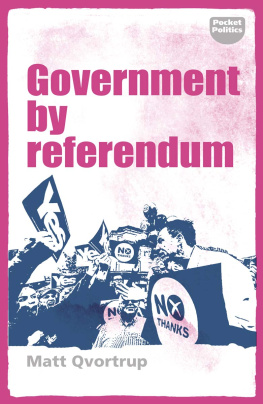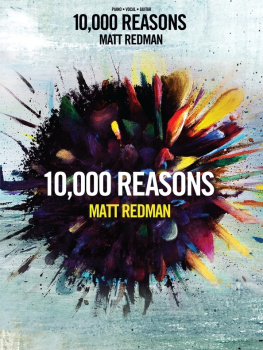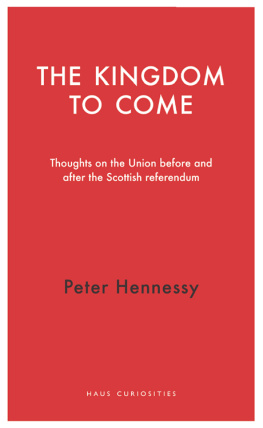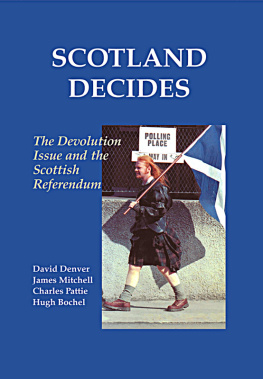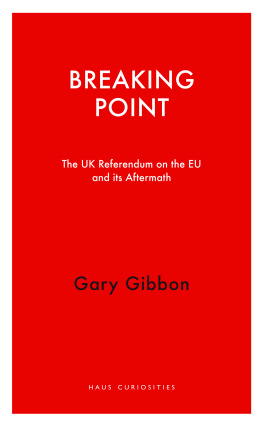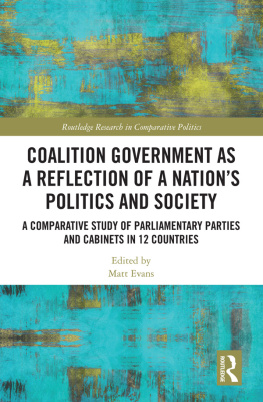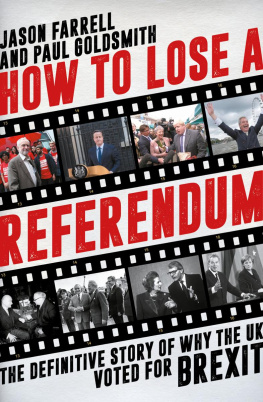Government by referendum
POCKET POLITICS
SERIES EDITOR: BILL JONES
Pocket politics presents short, pithy summaries of complex topics on socio-political issues both in Britain and overseas. Academically sound, accessible and aimed at the interested general reader, the series will address a subject range including political ideas, economics, society, the machinery of government and international issues. Unusually, perhaps, authors are encouraged, should they choose, to offer their own conclusions rather than strive for mere academic objectivity. The series will provide stimulating intellectual access to the problems of the modern world in a user-friendly format.
Previously published
The Trump revolt Edward Ashbee
Lobbying: An appraisal Wyn Grant
Power in modern Russia: Strategy and mobilisation Andrew Monaghan
Reform of the House of Lords Philip Norton
Government by referendum
Matt Qvortrup
Manchester University Press
Copyright Matt Qvortrup 2018
The right of Matt Qvortrup to be identified as the author of this work has been asserted by him in accordance with the Copyright, Designs and Patents Act 1988.
Published by Manchester University Press
Altrincham Street, Manchester M1 7JA
www.manchesteruniversitypress.co.uk
British Library Cataloguing-in-Publication Data
A catalogue record for this book is available from the British Library
ISBN 978 1 5261 3003 7 paperback
First published 2018
The publisher has no responsibility for the persistence or accuracy of URLs for any external or third-party internet websites referred to in this book, and does not guarantee that any content on such websites is, or will remain, accurate or appropriate.
Typeset by
Servis Filmsetting Ltd, Stockport, Cheshire
Mr. Alan Clark (Kensington and Chelsea): On a point of order, Madam Speaker. I am most grateful for your allowing me to raise a point of order that relates to the language in which we communicate in this Chamber. Your predecessor once rebuked me for using the language of the Common Market: I said faute de mieux, for which he immediately called me to order. The word referendum is being scattered about, but, although my hon. Friend the Member for Lichfield (Mr. Fabricant) used the correct plural, I have often heard colleagues refer to referendums, which is an exceedingly ugly term. May we have from you, Madam Speaker, a ruling, or at least an expression of preference, as to whether we continue to use the Latin word, which many would think historically appropriate in the Chamber, or whether you have no objection to the continual Anglicisation of the term and the use of the word referendums? Were you to express a preference for the Latin form, which I hope you will, you would certainly be striking a blow for classical revivalism.
Madam Speaker: The right hon. Gentleman raises an esoteric point, albeit hardly a point of order: more a matter of taste. I notice that, in the public Bills list, the word referendums is used in relation to Scotland and Wales. The word referendum was first used in English 150 years ago, according to the Oxford English dictionary, which I have just consulted, and I imagine that, after 150 years, the House is now used to it. The plural is a matter of taste, but I have always preferred the use of the English language to any Latin form; I hope that that provides some guidance.
From Hansard, 3 June 1998, col. 282
Contents
The author wishes to thank Laurence Morel, Marc Plattner, Vernon Bogdanor, David Altman, Matthew Shugart, Mogens Hansen, Laurence Whitehead, Philippe Schmitter, Yanina Welp, Guy Lachapelle, Thomas Webster, Bill Jones, Tony Mason and Arend Lijphart for critical discussions in the process of writing this book. The author is especially grateful to Sebastian Qvortrup, BA (Hons), for critical proofreading and suggestions.
London, 10 August 2017
R EFERENDUMS, wrote a columnist in The Observer in July 2016, are the nuclear weapons of democracy. In parliamentary systems they are redundant. Seeking a simplistic binary yes/no answer to complex questions, they succumb to emotion and run amok. Their destructive aftermath lasts for generations (Keegan : 43). It is a fair bet that the author did not vote for Brexit. The issue here is not to claim that politicians and pundits are fickle and unprincipled. The question here is an empirical one; was the pundit correct?
Are there more referendums now than in the past? And, if so, has that made the world become more democratic? Could it be that referendums are linked with the growth in social movements in recent years and the tendency to use alternative channels to challenge the status quo (see Della Porta ) have suggested?
All these questions are addressed in the following pages. However, the process did not quite follow the plan initially expected or planned. That is in the nature of things.
The chapters in this short book were originally intended to form part of a coherent and theoretical whole; to show how the use of the referendum followed a strict, almost Hegelian pattern of the unfolding of freedom throughout the ages as the 76) and David Cameron (201016) the more it became clear to me that there were different, sometimes competing, patterns. Rather than following G.W.F. Hegel, I came to a conclusion much like the one Ludwig Wittgenstein reached when he wrote his Philosophical Investigations. As this book is written in the same spirit of this much more illustrious work, I feel justified in quoting the Austrian philosopher at length:
After several unsuccessful attempts to weld my results together into such a whole, I realized that I should never succeed. The best that I could write would never be more than philosophical remarks; my thoughts were soon crippled if I tried to force them on in any single direction against their natural inclination. And this was, of course, connected with the very nature of the investigation. For this compels us to travel over a wide field of thought crisscross in every direction. The philosophical remarks in this book are, as it were, a number of sketches of landscapes which were made in the course of these long and involved journeys. The same or almost the same points were always being approached afresh from different directions, and new sketches made. Very many of these were badly drawn or uncharacteristic, marked by all the defects of a weak draughtsman. And when they were rejected a number of tolerable ones were left, which now had to be arranged and sometimes cut down, so that if you looked at them you could get a picture of the landscape. Thus this book is really only an album. (Wittgenstein : vii)
This book, then, is a series of remarks and sketches, which together form a mosaic rather than a coherent whole.
In the first chapter the world history of the referendum is outlined. A chapter follows this on the British experience up to 2010. This was initially intended to be a short overview of the previous referendums and a detailed analysis of more recent votes. However, when researching the book I noticed .
pertains to the United Kingdom European Union (EU) membership referendum in 2016, especially the campaign leading up to it. As in the previous chapter, this vote is analysed empirically but with several excursuses into the political theory.



